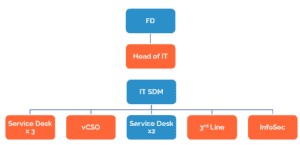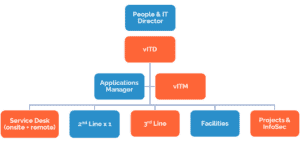In today’s digitally driven world, technology has become a central component of most charities – from managing operations, measuring impact, connecting with supporters, coordinating volunteers, and enabling organisations to develop new services.
Indeed, in our Charity IT survey we conducted earlier this year, over half of the leaders that took part are considering outsourcing via a partner.
Internal IT is undoubtedly highly valuable in terms of the sector & organisational knowledge, and relationships with the staff base that it brings. However, day-to-day IT operations such as reactive IT Support can be a significant drain on those resources. This is where a co-managed model can be extremely useful. By outsourcing to a trusted partner, it enables in-house teams to refocus on business enablement, charitable projects, and proactively supporting Data and Digital teams.
This is the essence of hybrid outsourcing – leveraging a partner(s) to handle day-to-day workloads like managing IT infrastructure, licensing, backups and hardware, providing first point of contact & triage for IT Support – to enhance your reach and capabilities.
Co-managed IT can also include augmenting skillsets in niche areas with fractional expertise – such as cyber security (for example, a “Virtual Chief Security Officer’ (vCSO) might represent your organisation for x days per month, with the deliverable of setting and tracking your cyber security strategy, with the internal team handling configuration and rollout.)
By blending this expertise into your IT function, you can take out the more laborious and time-consuming tasks, freeing up internal staff up to work more closely with the business to get more out of IT to underpin your mission; work that is ultimately more rewarding and motivational for them as individuals, as well as being more cost-effective than trying to hire and retain specialists in-house.
Below are a some examples of us working alongside large charities in a fully hybrid, co-managed model. These teams work together as one unit, to deliver the right expertise where it is needed, while retaining all the value that internal IT colleagues bring. However, it’s generally a good idea to start small; for example use a partner for just one function such as a Security Operations Centre (SOC), or 3rd Line IT Support working alongside your existing helpdesk, to test the partner and build confidence.
Key: Smartdesc / Customer
Example 1: Fractional IT Director / Head of IT, Hybrid IT Support

- Hybrid structure
- IT Leadership outsourced (dotted line to Head of Digital)
- IT Manager in-house
- Dedicated 2nd Line x 3 alongside 2 x in-house
- vCSO as a Service
- Allocated 3rd Line & Project
Example 2: Internal Applications & Data Manager, Hybrid IT Support

- Hybrid structure
- IT Leadership outsourced
- App/DB Manager in-house
- IT Manager outsourced
- Leveraged Service Desk SPOC and 1 x Dedicated 2nd Line onsite
- 1 x 2nd Line in-house
In conclusion, we have helped many charities benefit from implementing a hybrid / co-managed IT function, meaning they achieve:
- Cost savings – by having a blend of in-house local IT staff and outsourced colleagues typically required for more specialist – therefore expensive – tasks, this saves costs as it is all seamlessly managed as one IT service, and does not require hiring more staff internally
- Access to expertise – gain access to on demand and multidisciplinary specialists at a fraction of the cost of a salary
- Supportive environment – Outsourcing day-to-day IT Operations allows in-house teams to work more closely with your business units, sharing their knowledge and applying their expertise proactively, which both grows and motivates them to keep learning and progressing with you
- Scalability – IT outsourcing provides flexibility – charities can scale their IT services up or down to meet changing needs and funding cycles
- Cyber Security Standards – Peace of mind for your Board and Trustees that your organisation is aligning to best practice and standards from across the sector, not over or under cooking cyber security
- Focus on Core Mission – By outsourcing IT tasks, charities can redirect their resources and energy toward their core mission. This results in improved efficiency and effectiveness in achieving their charitable goals
How to implement co-managed IT
At Smartdesc, we use a flexible resourcing model for hybrid or co-managed IT teams which we call ‘Smart-sourcing’. This combines the organisational knowledge, trust and commitment of our customers’ own internal staff members with the depth of experience, skills and expertise of our own IT professionals, whose sole focus is working with charities. You can find out more about our 6 steps to “Smart Outsourcing” in a blog here.
By partnering with IT experts and starting small with 1 or 2 IT functions, charities can streamline their operations, reduce costs, enhance security, and focus on delivering their core missions. As technology continues to evolve, embracing IT outsourcing is a win-win solution that enables charities to make a more significant difference in the communities they serve.
Find out more here, or contact us today to arrange a free IT consultation to discuss how a hybrid co-managed IT function could drastically improve IT Service Delivery, and help you retain your highly valued internal resources for the long term.
